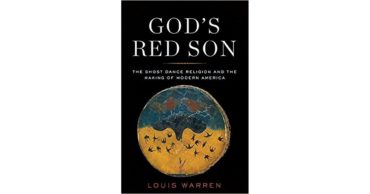Host Mitch Jeserich speaks with Louis S. Warren about his book Gods Red Son: The Ghost Dance Religion and the Making of Modern America, which describes the pan-Indian religious movement that swept across the west and the great plain as a form of resistance and reconciliation to colonialism. This book is critical to understanding how the Ghost Dance contributed to the development of modern America and Native Americans today.



I am Hupa/Yurok/Karok, northern California tribes. I stumbled into the middle of Mr. Jeserich’s very interesting interview of Mr. Warren, and was sorry not to hear it entirely. Some of his comments awakened memories from my own life and past…
I went to high school in central California in the ’70s, during which the treatment of Indian students, as well as presentation of Native Americans in mainstream history, was being scrutinized. I studied and reported about Wovoka and the Ghost Dance at that time, motivated by my new awareness of the massacre at Wounded Knee. Today, I learned new things about the subject. I find myself agreeing with Mr. Warren’s assessment of the prevailing view of American Indians among American non-Indians: most of my life, I have been greeted with a fair amount of surprise that we are alive, and so is our culture. But, this is no accident. The annihilation of us from national consciousness was not only a response to guilt; it was explicit in laws and government policy…
It was Mr. Warren’s comments about the lesser-known admonitions of Wovoka’s teachings, and then his description of Wovoka as a person, that really rang a bell. Wovoka is reported to have advised his followers to “work for white people”, to learn to survive among them, and to get educated in their schools and churches. (Wovoka was a hard worker himself on the white ranches of northern Nevada.) But, not in order to become assimilated. Instead, this was to ensure the survival of Indians, and give hope for the preservation of their culture, which he promised would be revived. The memory of my grandfather, David Risling, Sr., hit me like an exploding meteor when I heard this…
David was a young boy when he and other young Hupas were taken from their parents and sent to boarding schools, where evidence of Indian culture (dress, hair, language, songs, dancing) was forbidden. Most of the traditional dances back home had, like the Ghost dance, been outlawed. But my grandfather ran away, over and over, until he finally made it into Canada at age 14. There, out of reach from the U.S. Army, he got jobs, made friends, including natives from other tribes, and found his path to survival. But he never relinquished the memory that, back home, someone was trying to erase his people’s culture. And when he returned to find his fears realized — no dances, no medicine, traditional homes and dress replaced by the white styles he was now familiar with — he set about to change things. The words from his mouth reflected his life “You’ve got to learn to live in both worlds, Indian and white, to survive. But never forget who we are.” He organized “shows” of traditional dances, which were popular among white audiences, and under this umbrella was permitted to teach our own people our outlawed dances. I learned many of them myself dancing them at the Humboldt County Fair. When law and climate were right, he helped the Hupa parents wrest control of the reservation school district from the Federal government. He started Indian-owned businesses: lumber mills, stores, a gas station. And when his son was about to leave home to become the first California Native to graduate from college, he again admonished, “Never forget who you are.” The second half of Wovoka’s message…
Now, many of the tribal ceremonies and celebrations are taking place again. Fishing, and other traditional resource rights promised by treaty, have been or are being restored. For other tribes, land has been returned, preserving ceremonies that have been practiced there for thousands of years. And Grandpa’s college-bound son, David Risling, Jr., my father, went on to found the first flourishing Native American Studies department at U.C. Davis, and the first California college, DQU, devoted to serving the needs of Native Americans in their own communities. He was also active founding organizations that support Native parents, Indian legal rights, international Native rights, and more. I believe that there is a deeper truth behind the fact that these people, these leaders who never met and did not know of each other, shared a vision.